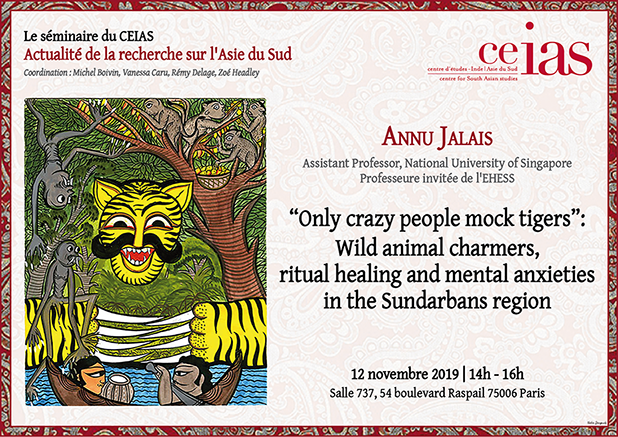Cycle - Actualité de la recherche sur l'Asie du Sud |
“Only crazy people mock tigers”: Wild animal charmers, ritual healing and mental anxieties in the Sundarbans region
Actualité de la recherche sur l'Asie du Sud - Séminaire du CEIAS
Salle 737, 54 boulevard Raspail 75006 Paris
Annu Jalais
Assistant Professor, National University of Singapore - Professeure invitée de l'EHESS
Mental illness and suicides are very widespread in deltaic Bengal – especially in the Sundarbans region. One of the ways in which people fall prey to mental illness is through the ‘fear’ contracted after having seen or been in some sort of physical proximity with the nonhuman world. Following Descola and those who have worked on various forms of human-animal environments, my research explores the ‘nonhuman’ to discuss the natural world from the Sundarbans islanders’ point of view. When someone ‘catches fear’, that person is seen as needing to be cured of it lest it ends up disturbing the person’s mental well-being and potentially causing death. The ‘cure’ is usually provided by a ritual healer, customarily a person who also works in the forest, and is a ‘tiger-charmer’. Research in ethno-psychiatry suggests that ritual healing may actually be therapeutically effective. However, for one to be able to account for how it works in the case, for example, of human/nonhuman environments, one has to understand a particular cosmological worldview where nonhumans are seen as being part of a common world with humans and not one where they are seen as separate. My research delves into what ‘ecopsychiatry’ might mean from indigenous healers’ perspectives.
Les sites du CEIAS
- SAMAJ | The South Asia Multidisciplinary Academic Journal
- CEIAS - Facebook
- CEIAS - Twitter
- CEIAS - Newsletter
- Le Bulletin de la Bibliothèque
- Régionalisme & cosmopolitisme
- DELI | Dictionnaire Encyclopédique des Littératures de l’Inde
- DHARMA | The Domestication of “Hindu” Asceticism and the Religious Making of South and Southeast Asia
- TST | Texts Surrounding Texts
- STARS | Studies in Tamil Studio Archives and Society 1880-1980
- I-SHARE | The Indian Subcontinent’s Shared Sacred Sites
- Sri Lanka et diasporas
- Sindhi Studies Group
- Carnet du Master Études asiatiques
- Master “Asian Studies”
- Social Sciences Winter School in Pondicherry
- Caste, Land and Custom
- Musiques indiennes en terres créoles
 Actualités
Actualités
Devenir juifs : conversions et assertions identitaires en Inde et au Pakistan
 Débat - Mardi 9 mai 2023 - 14:00Présentation« L’an prochain à Jérusalem ! », scande un homme portant une kippa dans une synagogue de Karachi au Pakistan. Ses paroles sont répétées en chœur par les membres de sa communauté, un groupe comptant près de trois cents personnes qui s’autodésignent par (...)(...)
Débat - Mardi 9 mai 2023 - 14:00Présentation« L’an prochain à Jérusalem ! », scande un homme portant une kippa dans une synagogue de Karachi au Pakistan. Ses paroles sont répétées en chœur par les membres de sa communauté, un groupe comptant près de trois cents personnes qui s’autodésignent par (...)(...)
Le Centre d'études sud-asiatiques et himalayennes (Cesah), nouveau laboratoire de recherche (EHESS/CNRS) sur le Campus Condorcet
Échos de la recherche -Depuis le 1er janvier 2023, l'EHESS, en tant que co-tutelle, compte un nouveau centre de recherche né de la fusion du Centre d'études de l'Inde et de l'Asie du Sud (CEIAS - EHESS/CNRS) et du Centre d’études himalayennes (CEH - CNRS) : le Centre d'études sud-asiatiques et h (...)(...)
Centre d'Études de l'Inde et de l'Asie du Sud
UMR8564 - CNRS / EHESS
54 boulevard Raspail
75006 Paris, France
Tél. : +33 (0)1 49 54 83 94
Communication :
nadia.guerguadj[at]ehess.fr
Direction :
dir.ceias[at]ehess.fr
La bibliothèque du CEIAS
Maison de l'Asie
22 avenue du Président Wilson 75016 Paris
54 boulevard Raspail
purushartha[at]ehess.fr


